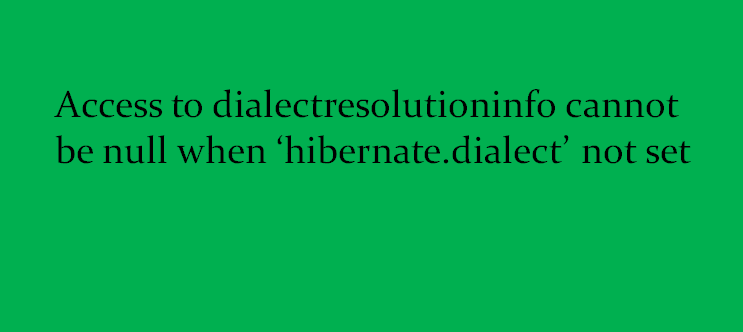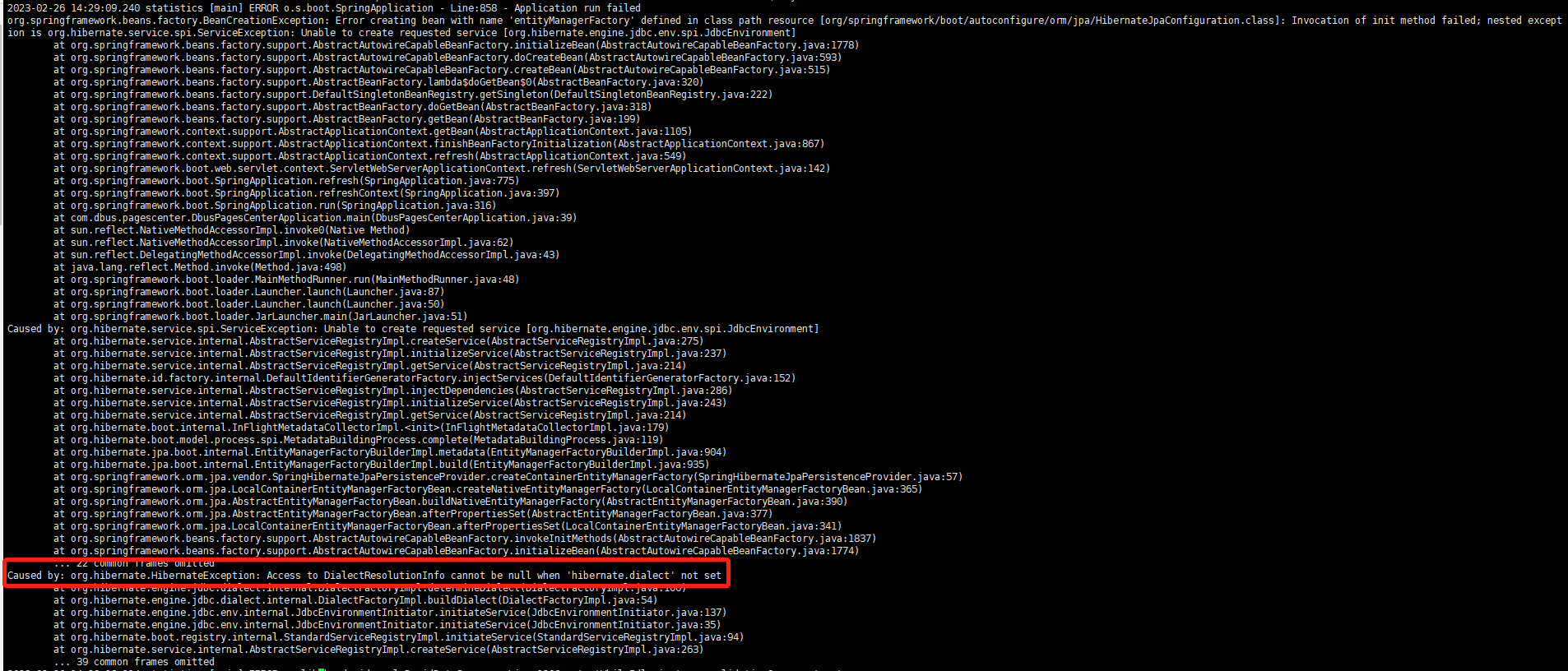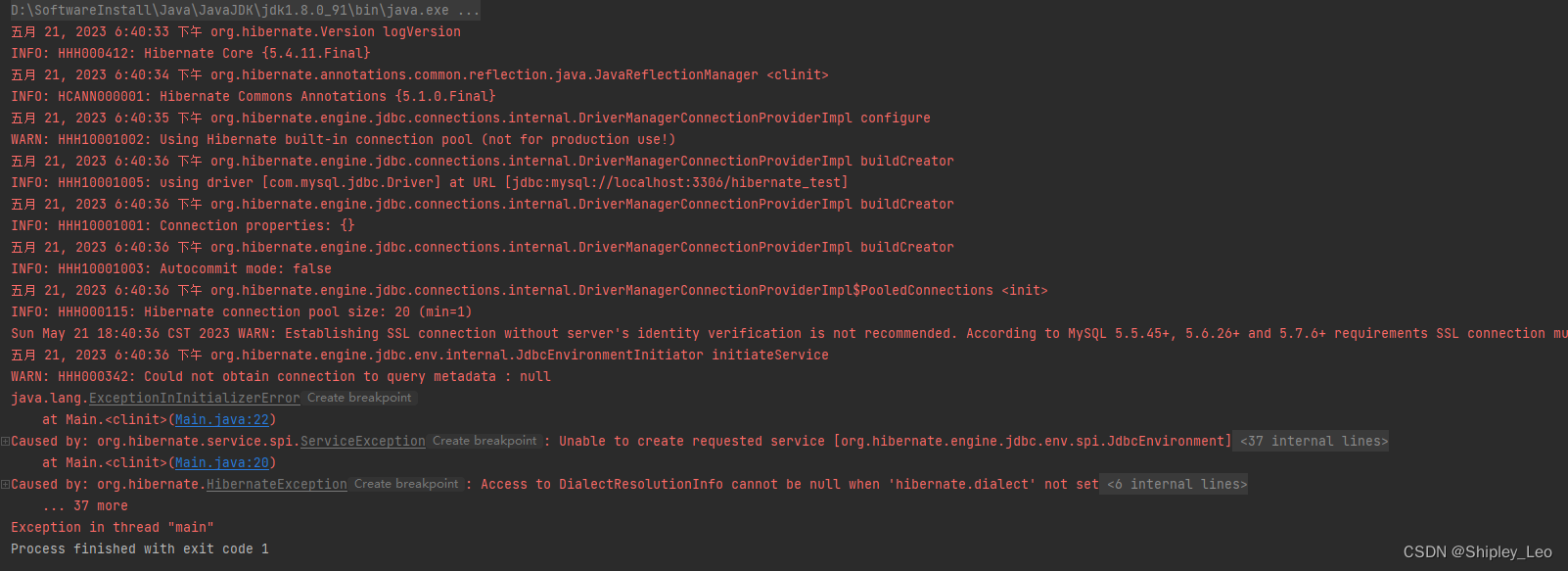Access To Dialectresolutioninfo Cannot Be Null When ‘Hibernate.Dialect’ Not Set
Introduction:
In the world of software development, Hibernate is widely recognized as one of the most popular object-relational mapping (ORM) technologies. It offers a convenient way for developers to interact with databases through Java objects, eliminating the need for writing complex SQL queries manually. However, like any other technology, Hibernate has its own quirks and limitations, one of which is the importance of dialect resolution. In this article, we will explore the significance of dialect resolution in Hibernate and the consequences of not setting it properly. We will also discuss how Hibernate handles the absence of dialect resolution information and provide best practices for configuring this crucial aspect of Hibernate.
What is the importance of dialect resolution in Hibernate?
Dialect resolution plays a crucial role in Hibernate as it determines the appropriate SQL dialect to be used when communicating with the database. Each database vendor typically has its own set of SQL dialects that introduce variations in syntax, functions, and features. By specifying the correct dialect, Hibernate can generate and execute SQL statements that are compatible with the targeted database.
What happens when the ‘hibernate.dialect’ property is not set?
When the ‘hibernate.dialect’ property is not set in the Hibernate configuration, it can lead to various issues and errors. One common error that developers may encounter is the “Access to DialectResolutionInfo cannot be null” exception. This exception indicates that Hibernate cannot determine the appropriate SQL dialect as the necessary information has not been provided.
How does Hibernate handle the absence of dialect resolution information?
In the absence of dialect resolution information, Hibernate attempts to automatically detect the SQL dialect based on the JDBC connection URL. Although this automatic detection mechanism is helpful in some cases, it may not always produce accurate results, especially when dealing with non-standard or less common databases.
To mitigate this issue, one can explicitly set the ‘hibernate.dialect’ property in the Hibernate configuration file. By providing the correct dialect for the targeted database, developers can ensure that their application generates and executes SQL statements that adhere to the syntax and behavior specific to that database.
How can the configuration for dialect resolution be set in Hibernate?
The configuration for dialect resolution in Hibernate can be set in various ways, depending on the framework or environment being used. Let’s explore some of the commonly used methods for configuring dialect resolution in different scenarios:
1. Standalone Hibernate Configuration:
In a standalone Hibernate configuration, the ‘hibernate.dialect’ property can be set directly in the hibernate.cfg.xml file. For example, to configure the PostgreSQL dialect, the following line can be added to the configuration file:
“`
2. Spring Boot with Spring Data JPA:
In a Spring Boot application with Spring Data JPA, the dialect resolution can be configured through application.properties or application.yml. For example, to configure the MySQL dialect, the following line can be added to the application.properties file:
“`
spring.jpa.properties.hibernate.dialect=org.hibernate.dialect.MySQLDialect
“`
3. Standalone Spring Hibernate Configuration:
In a standalone Spring Hibernate configuration, the dialect resolution can be set in the applicationContext.xml file. For example, to configure the Oracle 19c dialect, the following line can be added to the configuration file:
“`
…
“`
What are the consequences of not setting the dialect resolution in Hibernate?
Failing to set the dialect resolution in Hibernate can lead to several negative consequences. Firstly, and most importantly, it can cause compatibility issues with the targeted database. Since each database vendor has its own set of SQL dialects and capabilities, not specifying the correct dialect can result in syntax errors or unexpected behavior when executing SQL statements.
Furthermore, omitting the dialect resolution can also lead to performance degradation. Hibernate relies on the SQL dialect to optimize the generated SQL statements and take advantage of specific database features. Without the proper dialect information, Hibernate may not be able to optimize queries effectively, resulting in slower execution times and increased resource consumption.
Best practices for setting the dialect resolution in Hibernate:
To ensure smooth operation of Hibernate and maximize its compatibility and performance, it is essential to follow the best practices for setting the dialect resolution. Here are some guidelines to keep in mind:
1. Always explicitly set the ‘hibernate.dialect’ property in the Hibernate configuration to avoid any ambiguity or reliance on automatic detection mechanisms.
2. Choose the correct dialect that corresponds to the targeted database. Some commonly used dialects include ‘org.hibernate.dialect.MySQLDialect’ for MySQL, ‘org.hibernate.dialect.PostgreSQLDialect’ for PostgreSQL, and ‘org.hibernate.dialect.Oracle19cDialect’ for Oracle 19c.
3. Keep the dialect information up to date. Hibernate is constantly evolving, and new dialects are introduced regularly. Ensure that you are using the latest version of Hibernate and the appropriate dialect for your specific database version.
4. Test the application thoroughly after configuring the dialect resolution. Perform functional and performance testing to verify that the application behaves as expected and meets the required performance criteria.
Frequently Asked Questions (FAQs):
Q: What is the purpose of dialect resolution in Hibernate?
A: The dialect resolution determines the appropriate SQL dialect to be used when communicating with the database, ensuring compatibility and optimal performance.
Q: What happens if the ‘hibernate.dialect’ property is not set?
A: Without the ‘hibernate.dialect’ property, Hibernate may fail to determine the appropriate SQL dialect, resulting in errors and unexpected behavior.
Q: How can the dialect resolution be configured in a Spring Boot application with Spring Data JPA?
A: In a Spring Boot application with Spring Data JPA, the dialect resolution can be configured through the application.properties or application.yml file using the ‘spring.jpa.properties.hibernate.dialect’ property.
Q: What are the consequences of not setting the dialect resolution in Hibernate?
A: Not setting the dialect resolution can lead to compatibility issues with the database and performance degradation due to suboptimal query execution.
Q: What are some common dialects used in Hibernate?
A: Some commonly used dialects include ‘org.hibernate.dialect.MySQLDialect’ for MySQL, ‘org.hibernate.dialect.PostgreSQLDialect’ for PostgreSQL, and ‘org.hibernate.dialect.Oracle19cDialect’ for Oracle 19c.
In conclusion, ensuring the proper configuration of dialect resolution in Hibernate is essential for seamless database interaction and optimized performance. By understanding the significance of dialect resolution, developers can avoid errors and compatibility issues and harness the full power of Hibernate in their applications.
Java : Access To Dialectresolutioninfo Cannot Be Null When ‘Hibernate.Dialect’ Not Set(5Solution)
Is Dialect Mandatory In Hibernate?
Hibernate is a widely used object-relational mapping (ORM) framework for Java, which simplifies the process of interacting with databases. When working with Hibernate, developers often come across the concept of “dialect.” Dialect is an important aspect of Hibernate configuration, as it defines the SQL variant that Hibernate should use to communicate with the database. However, the question arises: Is specifying a dialect mandatory in Hibernate? Let’s delve into this topic to provide a comprehensive understanding.
Understanding Dialect in Hibernate:
Before discussing whether specifying a dialect is mandatory, it is crucial to understand what dialect is and how it affects Hibernate. In Hibernate, dialect serves as a bridge between the HQL (Hibernate Query Language) or JPQL (Java Persistence Query Language) queries and the actual database being used.
Each database system has its own SQL implementation, which leads to non-standardized SQL syntax and functions. This can be problematic when developing an application that supports multiple databases. Hibernate’s dialect tackles this issue by providing a uniform API for the different databases. It abstracts the variations between databases, allowing developers to write portable SQL database-independent code.
In addition to abstracting database differences, Hibernate’s dialect also provides features such as generational strategies for primary keys and limited support for user-defined functions. Therefore, specifying the appropriate dialect is crucial to ensure that Hibernate generates the correct SQL statements and performs optimally.
Mandatory or Optional?
Now, let’s address the question at hand: Is specifying a dialect mandatory in Hibernate? The short answer is yes. Specifying a dialect is a mandatory step in the Hibernate configuration. Hibernate requires the dialect to accurately generate the appropriate SQL statements for each database.
If the dialect is not specified, Hibernate will not be able to communicate effectively with the chosen database, resulting in SQL syntax errors and potential performance issues.
Moreover, without a dialect, Hibernate’s ability to generate efficient and optimized SQL statements based on the particular database’s features and optimizations will be compromised. This could lead to suboptimal query performance and increased database load.
Common Dialects:
Hibernate supports a wide range of databases, and for each supported database, there is a specific dialect that needs to be configured. Some of the common dialects used in Hibernate include:
1. Oracle: org.hibernate.dialect.OracleDialect
2. MySQL: org.hibernate.dialect.MySQLDialect
3. PostgreSQL: org.hibernate.dialect.PostgreSQLDialect
4. SQLite: org.hibernate.dialect.SQLiteDialect
5. SQL Server: org.hibernate.dialect.SQLServerDialect
These dialects handle the specific SQL syntax, HQL/JPQL statement generation, and database-specific optimizations required for the respective databases.
FAQs:
Q1. Can I use a generic dialect in Hibernate instead of specifying a specific dialect for each database?
A1. While Hibernate provides a generic dialect (org.hibernate.dialect.Dialect), it is highly recommended to use the specific dialect for the target database. The specific dialect ensures maximum compatibility and performance optimizations.
Q2. Can I switch the dialect at runtime based on the database being used?
A2. Unfortunately, Hibernate does not support runtime dialect switching. The dialect needs to be specified during the configuration phase, and it remains constant throughout the application’s execution.
Q3. What happens if I specify the wrong dialect in Hibernate?
A3. If the wrong dialect is specified, Hibernate may generate incorrect SQL statements or encounter syntax errors when communicating with the database. It is crucial to double-check the dialect and ensure it matches the database being used.
Q4. Can I create a custom dialect for a specific database?
A4. Yes, Hibernate allows developers to create custom dialects for databases that are not officially supported. This can be useful when working with lesser-known or proprietary databases.
Conclusion:
In conclusion, specifying a dialect is indeed mandatory in Hibernate. Dialects play a vital role in enabling Hibernate to generate optimized SQL statements and abstract the variations between database systems. By choosing the correct dialect for the target database, developers can ensure maximum compatibility, performance, and portability in their Hibernate-based applications.
What Is Hibernate Dialect For Oracle?
Hibernate is a popular open-source object-relational mapping (ORM) framework for Java applications. It provides a simple and convenient way to interact with databases by abstracting the underlying database systems. To seamlessly integrate Hibernate with different database providers, Hibernate offers a variety of dialects specific to each database. In the case of Oracle, Hibernate provides a dedicated dialect known as the “Oracle Dialect.”
The Hibernate Oracle Dialect serves as a bridge between Hibernate and the Oracle database, ensuring compatibility and optimal performance. It handles the translation of Hibernate queries and operations into database-specific SQL statements understandable by Oracle. By using the Oracle Dialect, developers can leverage the full potential of Oracle database features and functionalities while benefiting from the convenience and productivity of Hibernate.
Key Features and Capabilities:
1. SQL Dialect: The Oracle Dialect is responsible for generating the appropriate SQL statements required for database operations such as insertions, updates, deletions, and selections. It abstracts the differences in SQL syntax and semantics between different database vendors, allowing developers to write database-agnostic code.
2. Paging and Limiting Results: Hibernate Oracle Dialect includes support for paging and limiting results, which is essential for efficiently retrieving and displaying data in modern applications. It enables developers to specify the maximum number of rows to return and the starting offset, ensuring performance and scalability when dealing with large datasets.
3. Database-Specific Optimizations: Oracle provides a rich set of performance optimizations and advanced features. The Oracle Dialect allows developers to take advantage of these optimizations by generating SQL statements that utilize Oracle-specific functionalities like query hints, data partitioning, and parallel execution.
4. Data Types Mapping: Oracle Dialect handles the mapping of Java data types to the corresponding Oracle database types. It ensures that the data is stored and retrieved correctly, considering the differences in data type representations between Java and Oracle. This ensures data integrity and consistency during the interaction between the ORM layer and the database.
5. Transaction Control: Hibernate Oracle Dialect supports transaction management, allowing developers to handle database transactions through Hibernate’s abstraction layer. It provides the necessary infrastructure to manage and coordinate multiple database operations as part of a single transaction, ensuring data consistency and atomicity.
Frequently Asked Questions (FAQs):
Q: Do I need to configure Hibernate Oracle Dialect explicitly?
A: Yes, when setting up Hibernate for an Oracle database, you need to specify the Oracle Dialect in the Hibernate configuration file or programmatically during runtime. This ensures that Hibernate generates the correct SQL statements and interacts correctly with the Oracle database.
Q: Are there any additional dependencies required when using the Oracle Dialect?
A: Yes, to use the Oracle Dialect, you need to include the appropriate Oracle JDBC driver as a dependency in your project. This allows Hibernate to establish a connection with the Oracle database and execute SQL statements.
Q: Can I use Hibernate Oracle Dialect with other Oracle-compatible databases?
A: Although the Oracle Dialect is primarily designed to work with the Oracle database, it can also be used with other Oracle-compatible databases, such as Oracle Database Express Edition (XE), Oracle Database Cloud Service, and Amazon RDS for Oracle. However, certain database-specific features might not be available in those environments.
Q: Does Hibernate Oracle Dialect support advanced Oracle features like Materialized Views and Triggers?
A: Yes, the Oracle Dialect supports advanced Oracle features like Materialized Views, Triggers, and stored procedures. You can use Hibernate’s mapping annotations or XML mappings to define and utilize these database-specific features seamlessly.
Q: Can Hibernate Oracle Dialect handle large datasets efficiently?
A: Yes, Hibernate Oracle Dialect offers efficient pagination and result limiting capabilities, allowing developers to handle large datasets effectively. It enables you to retrieve a specific number of rows, starting from a configurable offset, minimizing unnecessary data transfer between the database and the application.
In conclusion, the Hibernate Oracle Dialect plays a vital role in integrating Hibernate with Oracle databases. It provides a transparent and efficient interface, allowing developers to focus more on the business logic of their applications rather than the underlying database operations. By leveraging the features and optimizations offered by Oracle, developers can build robust and high-performing applications while benefiting from the elegance and simplicity of Hibernate.
Keywords searched by users: access to dialectresolutioninfo cannot be null when ‘hibernate.dialect’ not set hibernate.dialect mariadb, spring.jpa.properties.hibernate.dialect postgres, Spring JPA Hibernate dialect, MySQL dialect, Org hibernate dialect PostgreSQLDialect, Spring JPA properties Hibernate dialect MySQL, Org hibernate dialect oracle 19c dialect, Unable to open JDBC Connection for DDL execution
Categories: Top 85 Access To Dialectresolutioninfo Cannot Be Null When ‘Hibernate.Dialect’ Not Set
See more here: nhanvietluanvan.com
Hibernate.Dialect Mariadb
The “hibernate.dialect” property is responsible for instructing Hibernate on the syntax and features of the database it is working with. MariaDB, a fork of MySQL, is known for its compatibility with the MySQL dialect. For that reason, Hibernate provides a specific dialect for MariaDB to leverage its features effectively. By setting the “hibernate.dialect” property to “org.hibernate.dialect.MariaDBDialect,” Hibernate can appropriately generate SQL statements targeted for MariaDB.
When using the MariaDB dialect, Hibernate takes advantage of some unique features provided by MariaDB that are not present in other databases. MariaDB offers advanced indexing capabilities, such as extended keys, which encompass different types of indexes like full-text indexes, spatial indexes, and XML indexes. Hibernate can maximize the performance of database queries by utilizing these specialized indexes.
Another notable feature of MariaDB is its support for virtual columns. Virtual columns are not physically present in the database but are derived using expressions or functions on existing columns. With the MariaDB dialect, Hibernate can work seamlessly with virtual columns, allowing developers to define virtual columns in their entity mappings and perform operations on them transparently.
Additionally, MariaDB introduces “sequence” objects that serve as an alternative to the traditional auto-increment columns. With the MariaDB dialect, Hibernate can use sequences instead of auto-generated values for primary key generation, resulting in more control and flexibility over primary key assignment.
Furthermore, MariaDB offers a range of optimizations and performance improvements over MySQL. These include thread pool scalability, query optimization enhancements, and InnoDB storage engine improvements. By leveraging the MariaDB dialect, Hibernate can take advantage of these optimizations, leading to better overall performance and efficiency of database operations.
Let us now delve into some frequently asked questions related to the usage of the MariaDB dialect in Hibernate:
Q: Where can I find the required Hibernate dialect class for MariaDB?
A: The dialect class for MariaDB, “org.hibernate.dialect.MariaDBDialect,” comes bundled with Hibernate. You can simply reference it by setting the “hibernate.dialect” property in your Hibernate configuration file.
Q: Can I use the MariaDB dialect with other MySQL forks, like Percona Server or Amazon RDS for MySQL?
A: Yes, the MariaDB dialect can be used with other MySQL forks since they share similar syntax and features. However, it is always advisable to thoroughly test your application to ensure compatibility and stability.
Q: Are there any specific optimizations that the MariaDB dialect provides?
A: Yes, the MariaDB dialect allows Hibernate to take advantage of MariaDB’s advanced indexing capabilities, virtual columns, and sequence objects. These optimizations can lead to improved performance and flexibility in database operations.
Q: Can I switch from MySQL to MariaDB without making any changes to my Hibernate mappings?
A: In most cases, switching from MySQL to MariaDB should require minimal changes to your Hibernate mappings. However, it is advisable to thoroughly test your application after the switch to ensure that everything works as expected.
Q: Are there any limitations or considerations when using the MariaDB dialect?
A: The MariaDB dialect is designed to work seamlessly with MariaDB and provides extensive compatibility. However, it is always recommended to be aware of any differences in behavior or features between MariaDB and other databases you have previously used.
In conclusion, the “hibernate.dialect” property plays a crucial role in ensuring the compatibility and efficient usage of Hibernate with different databases. The MariaDB dialect provides specific optimizations and support for MariaDB’s advanced features, enabling developers to harness the full potential of this powerful open-source relational database management system. By understanding the capabilities and configurations of the MariaDB dialect, developers can unleash the full potential of Hibernate while interacting with MariaDB seamlessly.
Spring.Jpa.Properties.Hibernate.Dialect Postgres
Understanding the spring.jpa.properties.hibernate.dialect postgres property:
—————————————————————
The “spring.jpa.properties.hibernate.dialect” property is used to specify the SQL dialect that should be used by Hibernate for communication with the underlying database. Hibernate supports multiple dialects as different databases have their own SQL dialects. In the case of PostgreSQL, the dialect is set to “org.hibernate.dialect.PostgreSQLDialect.”
PostgreSQL is an advanced open-source object-relational database system known for its scalability, performance, and robustness. It implements the SQL standard closely and provides a wide range of additional features. Therefore, specifying the PostgreSQL dialect ensures that Hibernate generates the appropriate SQL statements and leverages PostgreSQL’s specific capabilities effectively.
Key features of PostgreSQL dialect:
———————————–
1. Supports advanced database features: PostgreSQL dialect allows developers to take advantage of various advanced features provided by PostgreSQL, such as JSONB data type, full-text search, and geometric data types, among others.
2. Optimizes performance: By using the PostgreSQL dialect, Hibernate can leverage specific optimizations provided by PostgreSQL, leading to improved performance and efficiency in database operations.
3. Handles database-specific behavior: Different databases may have varying behaviors and quirks when it comes to certain SQL queries or schema definitions. The PostgreSQL dialect ensures that Hibernate handles these database-specific behaviors appropriately, resulting in consistent and reliable behavior.
Using “spring.jpa.properties.hibernate.dialect postgres”:
——————————————————–
To utilize the PostgreSQL dialect with Hibernate in a Spring JPA application, you need to add the following property to your application.properties or application.yml file:
“`
spring.jpa.properties.hibernate.dialect=org.hibernate.dialect.PostgreSQLDialect
“`
By specifying this property, Hibernate understands that it should communicate with the PostgreSQL database using the appropriate dialect. This ensures that the generated SQL statements align with PostgreSQL’s syntax and semantics, optimizing compatibility and performance.
FAQs:
——
Q1. What happens if the “spring.jpa.properties.hibernate.dialect” property is not set?
If the dialect property is not explicitly set, Hibernate uses a default dialect based on the configured database connection. However, not setting the dialect explicitly can introduce compatibility issues when trying to use database-specific features or optimizations. Therefore, it is highly recommended to always specify the dialect property, especially when working with PostgreSQL.
Q2. Can I use a different dialect for other databases?
Yes, you can use a different dialect for different databases supported by Hibernate. Specify the appropriate dialect class for each target database in the respective configuration file. For example, for MySQL, you would set “spring.jpa.properties.hibernate.dialect=org.hibernate.dialect.MySQLDialect.”
Q3. Are there any alternative dialects for PostgreSQL?
Yes, there are alternative dialects available for PostgreSQL, depending on the specific use case or requirements. Some common examples include “org.hibernate.dialect.PostgreSQL10Dialect” and “org.hibernate.dialect.PostgreSQL95Dialect.” These dialects may provide additional features or optimizations specific to certain PostgreSQL versions.
Q4. Can I use the same dialect property in Spring Data JPA repositories?
Yes, the “spring.jpa.properties.hibernate.dialect” property can be used in conjunction with Spring Data JPA repositories. When you define a JPA repository interface, Spring Data JPA automatically handles the underlying Hibernate configuration, including the dialect. The same property value defined in application.properties or application.yml will be used for Spring Data JPA as well.
Q5. Can I override the dialect setting programmatically?
Yes, you can override the dialect setting programmatically in your Spring configuration. By creating a custom implementation of the “org.springframework.orm.jpa.vendor.AbstractJpaVendorAdapter” class and overriding the “getJpaDialect()” method, you can explicitly set the desired dialect for Hibernate.
Conclusion:
———–
The “spring.jpa.properties.hibernate.dialect postgres” property plays a vital role in configuring Hibernate with PostgreSQL in a Spring JPA application. It ensures that Hibernate generates appropriate SQL statements, makes use of PostgreSQL’s advanced features, and handles database-specific behaviors effectively. By utilizing the PostgreSQL dialect, you can optimize performance and achieve seamless integration between Hibernate and PostgreSQL, making development easier and more efficient.
Images related to the topic access to dialectresolutioninfo cannot be null when ‘hibernate.dialect’ not set

Found 31 images related to access to dialectresolutioninfo cannot be null when ‘hibernate.dialect’ not set theme





































Article link: access to dialectresolutioninfo cannot be null when ‘hibernate.dialect’ not set.
Learn more about the topic access to dialectresolutioninfo cannot be null when ‘hibernate.dialect’ not set.
- Access to DialectResolutionInfo cannot be null when …
- Access to DialectResolutionInfo cannot be null … – DigitalOcean
- Access to DialectResolutionInfo cannot be null when …
- [Solved] org.hibernate.HibernateException – Facing Issues On IT
- Spring Boot JPA – Access to DialectResolutionInfo cannot be …
- How to Solve Error Message Access to DialectResolutionInfo …
- Access to DialectResolutionInfo cannot be null when …
- Dialects in Hibernate – javatpoint
- Hibernate – SQL Dialects – GeeksforGeeks
- JDBC Connection and Dialect Configuration in Hibernate
- Why do I need to configure the SQL dialect of a data source?
- Erro Access to DialectResolutionInfo cannot be null … – Alura
- Access to DialectResolutionInfo cannot be null when … – 简书
See more: nhanvietluanvan.com/luat-hoc